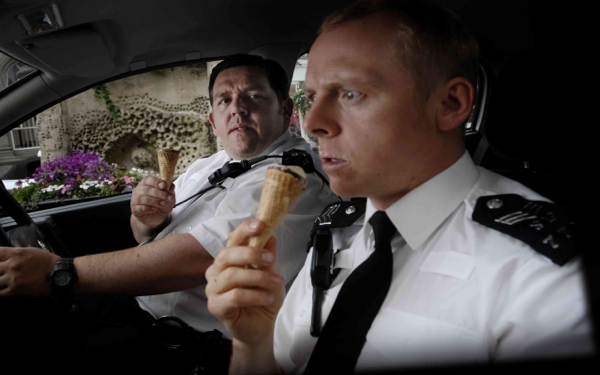Movie review by Greg Carlson
Edgar Wright, along with his usual conspirators, does to the homoerotic buddy cop action movie what his “Shaun of the Dead” did to Romero-esque zombie flicks. “Hot Fuzz,” starring “Shaun” pals Simon Pegg and Nick Frost, skewers big-budget Hollywood “bullet festivals” with a witty script and a parade of winking and clever pop culture references. As parodies go, “Hot Fuzz” boasts a beefier budget than “Shaun,” and the movie wears its ambition on its sleeve. The greater scale translates into extra flab in the running time, but the overall impact should please fans of Wright’s bright, breathless intelligence.
Co-scripter Pegg plays Nicholas Angel, a fastidious London police officer who finds himself banished to a quaint rural village by his somewhat jealous superiors. The movie’s opening scenes, aided by a trio of delicious cameo appearances by Martin Freeman, Bill Nighy, and Steve Coogan, immediately set a tone of playfulness that Wright is eager to maintain. Once Angel arrives at his new assignment, an additional set of cleverly cast performers turns up to the delight of movie buffs. Jim Broadbent, Timothy Dalton, and Edward Woodward, among others, relish the opportunity to spoof favorite films from the past.
Like “Shaun,” “Hot Fuzz” takes its sweet time getting around to what passes for plot, and Angel’s introduction to the Sandford police force is a slow-burn workshop. All of the town’s constables are memorably inane, from the indecipherable old-timer to the sneering, comically mustachioed plainclothes detectives. Frost plays Danny Butterman, the dim-witted but thoroughly lovable son of Broadbent’s chief who takes an immediate shine to Angel. Much to Angel’s chagrin, the two are partnered for long shifts spent visiting the local convenience store or searching for a missing swan. The screenplay uses Danny’s passion for American cop movies of the Joel Silver/Michael Bay/Jerry Bruckheimer variety as a vehicle to skewer the boys’ not-so-latent “bromance. ” References to “Point Break” and “Bad Boys II” are particularly humorous and superbly integrated.
“Hot Fuzz” takes a turn toward the surreal when a series of outrageously gruesome murders grabs the attention of the suspicious Angel. Naturally, the townspeople argue that the deaths were mere accidents, and their increasingly odd behavior nods toward the original “Wicker Man” movie in several ways. Despite the more mundane dimensions of the mystery plot device, “Hot Fuzz” works because the filmmakers clearly relish the very movies they are sending up. Wright meticulously restages the smoldering, affectionate exchange of looks and the slow-motion “shooting in mid-air” tropes perfected in franchises like the “Lethal Weapon” series.
When the movie finally arrives at the mayhem required by the genre, it very nearly wears out its welcome. A grocery-store shootout, along with a car chase and the total obliteration of both the town square and a scale replica of the charming hamlet, subscribe to the more is more school of action filmmaking. The ear-splitting volume that accompanies the imagery does as much to inspire a headache as it does laughter. When things aren’t exploding or being shot up, “Hot Fuzz” boasts a standout soundtrack, with ace selections including T. Rex, The Kinks, and Jon Spencer and the Elegant Two.
